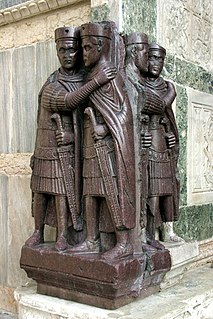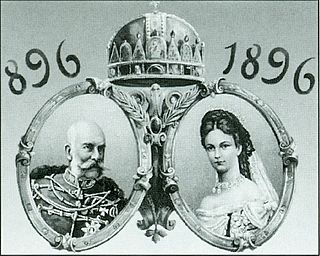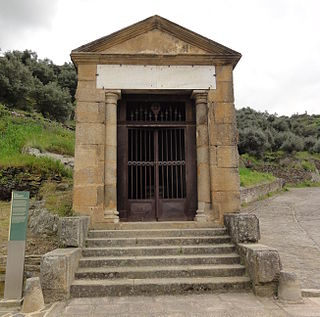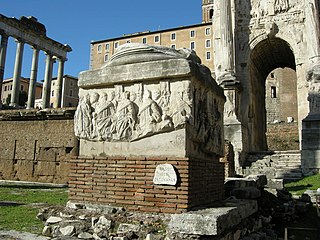
Around the start of the Common Era, the family trees of the gens Julia and the gens Claudia became intertwined into the Julio-Claudian family tree as a result of marriages and adoptions.

The Tetrarchy was the system instituted by Roman Emperor Diocletian in 293 to govern the ancient Roman Empire by dividing it between two senior emperors, the augusti, and their juniors and designated successors, the caesares. This marked the end of the Crisis of the Third Century.

Leo IV the Khazar was Byzantine emperor from 775 to 780 AD. He was born to Emperor Constantine V and Empress Tzitzak in 750. He was elevated to caesar the next year, in 751, and married to Irene of Athens in 768. When Constantine V died in September 775, while campaigning against the Bulgarians, Leo IV became senior emperor on 14 September 775. In 778 Leo raided Abbasid Syria, decisively defeating the Abbasid army outside of Germanicia. Leo died on 8 September 780, of tuberculosis. He was succeeded by his underage son Constantine VI, with Irene serving as regent.

Flavius Valerius Constantius "Chlorus", also called Constantius I, was a Roman emperor as one of the four original members of the Tetrarchy established by Diocletian in 293. He was a junior-ranking emperor (caesar) from 293 to 305, and senior emperor (Augustus) from 305 to 306. Constantius was also father of Constantine the Great, the first Christian emperor of Rome. The nickname Chlorus was first popularized by Byzantine-era historians and not used during the emperor's lifetime.

Decimius Magnus Ausonius was a Roman poet and teacher of rhetoric from Burdigala in Aquitaine, modern Bordeaux, France. For a time he was tutor to the future emperor Gratian, who afterwards bestowed the consulship on him. His best-known poems are Mosella, a description of the river Moselle, and Ephemeris, an account of a typical day in his life. His many other verses show his concern for his family, friends, teachers, and circle of well-to-do acquaintances and his delight in the technical handling of meter.

Kaiser is the German word for "emperor". In general, the German title in principal applies to rulers anywhere in the world above the rank of king (König). In English, the (untranslated) word Kaiser is mainly applied to the emperors of the unified German Empire (1871–1918) and the emperors of the Austrian Empire (1804-1918). During the First World War, anti-German sentiment was at its zenith; the term Kaiser—especially as applied to Wilhelm II, German Emperor—thus gained considerable negative connotations in English-speaking countries.
Ronald Reagan (1911–2004) was the 40th president of the United States.
Julia is the nomen of various women of the family Julii Caesares, a branch of the gens Julia, one of the most ancient patrician houses at ancient Rome.

Caesar is a title of imperial character. It derives from the cognomen of Julius Caesar, the Roman dictator. The change from being a familial name to a title adopted by the Roman emperors can be traced to AD 68, following the fall of the Julio–Claudian dynasty.

Gaius Octavius was a Roman politician. He was an ancestor to the Roman Emperors of the Julio-Claudian dynasty. He was the father of the Emperor Augustus, step-grandfather of the Emperor Tiberius, great-grandfather of the Emperor Claudius, and great-great grandfather of the Emperors Caligula and Nero. Hailing from Velitrae, he was a descendant of an old and wealthy equestrian branch of the gens Octavia. At Rome his family was part of the wealthy plebeian caste, and not being of senatorial rank, he was a novus homo. His grandfather, Gaius Octavius, fought as a military tribune in Sicily during the Second Punic War. His father, Gaius Octavius, was a municipal magistrate who lived to an advanced age.
Kerry Condon is an Irish actress. She is best known for her role as Octavia of the Julii in Rome, Stacey Ehrmantraut in Better Call Saul, and the voice of F.R.I.D.A.Y. in various films in the Marvel Cinematic Universe. She is also the youngest actress ever to play Ophelia in a Royal Shakespeare Company production of Hamlet.

The Julii Caesares were the most illustrious family of the patrician gens Julia. The family first appears in history during the Second Punic War, when Sextus Julius Caesar was praetor in Sicily. His son, Sextus Julius Caesar, obtained the consulship in 157 BC; but the most famous descendant of this stirps is Gaius Julius Caesar, a general who conquered Gaul and became the undisputed master of Rome following the Civil War. Having been granted dictatorial power by the Roman Senate and instituting a number of political and social reforms, he was assassinated in 44 BC. After overcoming several rivals, Caesar's adopted son and heir, Gaius Julius Caesar Octavianus, was proclaimed Augustus by the senate, inaugurating what became the Julio-Claudian line of Roman emperors.

Blood on the Sun is a 1945 American war film directed by Frank Lloyd and starring James Cagney and Sylvia Sidney. The film is based on the story behind the Tanaka Memorial document, which was said to be fiction by the Japanese government at the time, and has been disputed by some historians, although quite a few Japanese military actions leading up to World War II were predicted in the version of the document that reached the public.
Frank Condon, MA, MFA, is a playwright and theatrical production director, the founding Artistic Director of River Stage, in Sacramento, California, and a professor of theatre at Cosumnes River College. Condon is best known for bringing controversial plays to the theatre.

Jotapian was a usurper in the eastern provinces of the Roman Empire during the reign of Emperor Philip the Arab, around 249. Jotapian is known from his rare coins and from accounts in Aurelius Victor, Zosimus, and Polemius Silvius (Laterculus).

The constitution of the late Roman Empire was an unwritten set of guidelines and principles passed down, mainly through precedent, which defined the manner in which the late Roman Empire was governed. As a matter of historical convention, the late Roman Empire emerged from the Roman Principate, with the accession of Diocletian in AD 284, his reign marking the beginning of the Tetrarchy. The constitution of the Dominate outrightly recognized monarchy as the true source of power, and thus ended the facade of dyarchy, in which emperor and Senate governed the empire together.

The History of the Constitution of the Late Roman Empire is a study of the ancient Roman Empire that traces the progression of Roman political development from the abolition of the Roman Principate around the year 200 until the fall of the Western Roman Empire in 476 CE. When Diocletian became Roman Emperor in 284 CE, he inherited a constitution that was no longer functioning, and so he enacted the most significant constitutional reforms in over 300 years. His reforms, much like those 300 years before, were intended to correct the errors in the previous constitution. Diocletian's specific reforms were less radical than was the reality that he exposed the state of government for what it had been for centuries: monarchy. With Diocletian's reforms the Principate was abolished, and a new system, the Dominate, was established.

The Roman temple of Alcántara is located at one side of the Alcántara Bridge, Cáceres, Extremadura (Spain). Along with the Roman temple of Vic, it is one of the only two Roman temples preserved nearly complete in Spain.
An Enemy Of Men is a 1925 American silent melodrama film directed by Frank R. Strayer from an original script by Douglas Bronston. It stars Dorothy Revier, Cullen Landis, and Caesare Gravina, and was released by Columbia Pictures on July 1, 1925.

The Five-Columns monument is a dedicatory addition to the Rostra in the Roman Forum dating to the early fourth century CE. This monument was part of the Tetrarchy’s expansion of the Forum and is connected to the tenth anniversary of the Caesares within the four-ruler system. It is also referred to as the Fünfsäulendenkmal as well as the four-column monument, depending on Jupiter’s inclusion.












